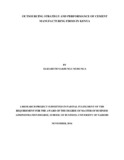| dc.contributor.author | Murunga, Elizabeth N | |
| dc.date.accessioned | 2017-01-05T11:09:25Z | |
| dc.date.available | 2017-01-05T11:09:25Z | |
| dc.date.issued | 2016 | |
| dc.identifier.uri | http://hdl.handle.net/11295/99193 | |
| dc.description.abstract | The cement manufacturing industry is a very vital sector in the development of the country. It therefore becomes important to develop strategies that will counter these challenges. It is against this backdrop that the study sought to find out outsourcing strategies in these cement manufacturing firms. Outsourcing is defined as the process by which a corporation, a governmental agency or another business entity subcontracts to a third party. Outsourcing strategy has become a common practice among both private and public organizations and is a major element in business strategy. Perhaps most organizations now outsource some of the functions they used to perform themselves. The cement manufacturing industry is not an exception to this regard and it is key component of the construction sector in Kenya and the region in general.The overall objective of the study was to determine the outsourcing strategy and performance of outsourced activities in the cement manufacturing firms in Kenya. This study was guided by various theoretical and literature reviews. This was a cross-sectional census survey research. The study had a total population of 6 cement manufacturing firms in Kenya.The study used primary data which was collected using questionnaires. Descriptive and Correlation analysis was used to analyze the quantitative data obtained. The study found out that the need to focus on core competencies and enhance efficiency were the factors influencing outsourcing strategy adoption. The performance indicators in outsourcing were improved technical capacity and enhanced performance contract. Further the study found out that the need to enhance operational efficiency, the need to focus and improve on core competencies and the need to attain a competitive advantage were the drivers for outsourcing strategy adoption while the need to outsource so as to copy competitors and establish strategic partnership were the factors that least influenced the adoption. In light of the findings, the study recommends that since most of the cement manufacturing firms have been successful in the adoption of outsourcing strategy, there is need to focus the change management especially to sensitize staff on outsourcing, also cost benefit analysis should be done so as to assess the impact of outsourcing to the firms. Corporate/commercial secrets should be safeguarded during the outsourcing process so as not to lose important information to outsiders. Therefore the study concludes that since for this case the attainment of greatest potential of outsourcing is two way then the cement manufacturing firms should embark on outsourcing strategy that is well advised in terms of business requirement so as not to hurt their competitive niche. | en_US |
| dc.language.iso | en | en_US |
| dc.publisher | University of Nairobi | en_US |
| dc.rights | Attribution-NonCommercial-NoDerivs 3.0 United States | * |
| dc.rights.uri | http://creativecommons.org/licenses/by-nc-nd/3.0/us/ | * |
| dc.title | Outsourcing Strategy and Performance of Cement Manufacturing Firms in Kenya | en_US |
| dc.type | Thesis | en_US |



